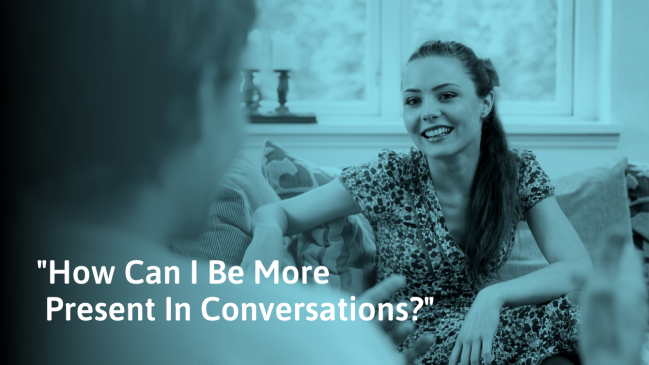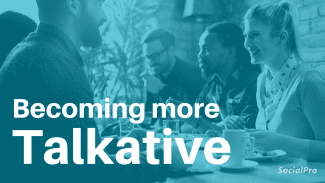Having great conversations is about making the other person feel interesting and important. Being more present and mindful in your conversations shows you are interested in others. It can also help you to have more fun, build your charisma, and give you more confidence in your social skills.
Here are some of the best ways to be more present and mindful during conversations.
1. Bring your mind back when it wanders
The first step to being more mindful during conversations is to notice when your mind is drifting.
When you get distracted, be kind to yourself. Beating yourself up about not paying attention will only distract you further.
Instead of berating yourself, accept that you got distracted and bring your attention back to the conversation.
Don’t make excuses. You will struggle to stay mindful sometimes. Try not to make excuses like “They were boring” or “They were repeating themselves.”
These excuses might make you feel better in the moment, but they can leave you feeling powerless.[1] Accepting that you are working on something difficult can make it easier to learn.
2. Avoid multitasking
Multitasking might be becoming normal during conversations, but it makes it much harder to be fully present and mindful. Instead, try focusing your attention.
We sometimes use multitasking as a crutch. By multitasking, we don’t fully commit to the conversation. This gives us an excuse if things go badly but makes it less likely that the conversation will feel like a success. Put your phone away and focus solely on the conversation to help you form deeper connections.
3. Use tasks to ease difficult conversations
One time that it can be helpful to multitask is during really emotional conversations. Sharing a task with someone you’re talking to can help keep the intensity of the conversation manageable. You could work together on a simple gardening task or do some housework while talking. Try to stick to a simple task that needs relatively little discussion.
If you’re using this strategy, discuss it with the other person in advance. Otherwise, they might not understand what you’re trying to do and feel silenced or confused.
3. Identify when your mind wanders
You might struggle more in some types of conversations than others. If there’s a common thread to when your mind wanders, ask yourself what this tells you.
For example, if you struggle to stay involved during emotional conversations, you might be trying to avoid conflict. Resolving underlying issues (for example, through therapy) can make it easier to stay focused and present in your conversations.
4. Don’t rely on rehearsed stories
Many people have established stories they tell. This can be an easy way to make conversation, but it creates emotional distance. Rehearsed stories let you zone out and disconnect. Instead of talking on auto-pilot, try to respond authentically and be present.
Practice tailoring your stories to the other person. Pay attention to their interests and adjust your conversation to reflect that. Try focusing on the connection to the other person rather than your own performance.
5. Be curious about what the other person has to say
Being curious is a great way to stay present and engaged in social situations. This isn’t about pretending to be interested in something you find boring. Instead, try to genuinely be interested in other people.
Become more curious about others by practicing people watching. Try spending 30 minutes in a cafe or other public place just watching the people around you. Imagine what they might be doing or thinking and wonder about who they are.
6. Ask questions
Asking questions helps to keep you present and mindful in a conversation. It can also help to build your curiosity further. When you are asking questions, you are engaging with what the other person has to say, thinking about what else you would like to know, and trying to understand more about how they see the world.
Ask questions that you’re interested in the answers to. Asking questions for the sake of it doesn’t help you to stay engaged. Think about what you might like to know, and then ask about it.
For example, if someone is talking about a recent race they ran, you might like to ask about their training to prepare for the run. Alternatively, you might be more interested in how they felt about the race itself, physically or emotionally. If you’re not that into running you might be more interested in why they enjoy running, so try asking about that.
To get to know someone better, try asking about thoughts and feelings rather than facts. In the example above, you would probably find out more about the other person’s personality and values by asking why they enjoyed running than by asking about their training regimen.
If you need some help learning how to ask interesting questions, check out our guide on how to use the FORD method. You can also read more about how to use questions to keep a conversation flowing naturally.
7. Avoid making assumptions
It’s easy to lose focus during conversations if you believe that you already know what the other person is going to say. Try to avoid this and stay focused on the conversation by minimizing assumptions.
Research suggests that we tend to assume that other people will agree with us more than they actually do.[2] Similarly, we can assume that we understand why others disagree with us only to find out we were wrong.[3]
When you notice yourself making assumptions, remind yourself that you’ve been surprised in the past. Try to be open-minded and listen to what they say.
8. Don’t just wait for your turn to speak
Conversations are about taking turns but don’t just wait for your turn. Show that you respect the other person by staying engaged when they are speaking.
Rather than planning your next comment, focus on what the other person is saying. Think about the words they use, their tone of voice, their body language, and the emotions they’re expressing.
You might worry that this will leave you with nothing to say when they stop speaking, but this is rarely the case. Instead, you’ll probably find that you have more to say because you’ve been listening closely.
9. Pause before speaking
Try not to start speaking as soon as the other person finishes. Taking a moment to pause helps you stay focused and shows that you are taking what they say seriously. It can also make you less anxious about what to say.
It can feel strange at first, so try to practice. Count to two silently before you speak. This can also help you avoid interrupting others. If pausing before you speak makes it difficult to join conversations, check out our tips for how to join a conversation without interrupting.
10. Try to understand the other person’s feelings
Most people talk more about events and things than they do about feelings. Improve your social skills and stay focused on conversations by trying to understand the other person’s emotions. Use their tone of voice and body language to guide you. Paying attention to their emotions can help you to build your empathy.
It’s important to remember that you can never be sure what someone else is feeling. Treat your guesses about their emotions as possibilities rather than certainties.
11. Read the other person’s body language
Paying attention to body language can help you to understand how the other person is feeling and feel more engaged in the conversation. It can also give you a better idea of how to respond to what they’re saying.
Learning the basics of body language can be a practical way to decode what you are seeing. Here is a list of the best books on body language.
11. Keep eye contact with the other person
Maintaining eye contact shows the other person that you are interested in what they have to say. It can also help to keep you mindful and present in a conversation.
We have a complete guide to making eye contact without being awkward.
12. Move the conversation on from boring topics
We’ve been looking at ways to stay focused on conversations, but you won’t be interested in talking about every topic. Smoothly moving conversations on can let you stay focused and present.
Every conversation is a shared responsibility. You’re trying to find something that you can both enjoy talking about. Politely reject topics you really don’t enjoy and offer alternatives that you do.
Consider being honest about topics you know nothing about. If they try to talk about a TV show, for example, you could say, “I go dancing most evenings, so I don’t get to watch much TV. Do you dance at all?”
13. Make notes during important conversations
Sometimes it’s even more important that you stay present in a conversation, for example, if your boss is telling you important information.
Making notes on what is said can help. This gives you something to refer back to and makes it less likely that your attention will wander.
14. Visualize what’s being said
You can’t always make notes during conversations, for example, if you are having a heartfelt conversation with a partner. You can try to use visualizations instead to keep you present in the conversation.
As the other person is talking, try to create an image of what they’re describing without getting too focused on the details.
15. Understand the impact of ADHD and other disorders
Having ADHD or other disorders can make it more difficult to stay mindful in conversations.[4]
Understanding your difficulties can help you find strategies to overcome them. Specific training can be invaluable in helping you to continue to feel present during a conversation.[5] You can find loads more information about ADHD-specific coaching here and here.
16. Practice ignoring negative self-talk when alone
Being present in a conversation means quieting your thoughts, especially negative ones. During conversations, there are lots of other things to worry about. Practicing ignoring negative thoughts alone can help you stay mindful in conversations.
Don’t try to push negative thoughts away. Attempting to suppress thoughts leads to a rebound effect, where they come back stronger.[6] Instead, accept that you’re having negative thoughts without agreeing with them.
Try saying to yourself, “This thought is just caused by my anxieties. It’s OK that I feel this way, but right now, I need to focus. This can wait.”
Meditation and daily mindfulness practice can help you to be more mindful in all aspects of your life, including during conversations.
Common questions
Why do we need to have more engaging conversations?
Having engaging conversations is how we make deeper and more meaningful relationships with others. The more present and mindful you are, the more rewarding the conversation and the more connected you will probably feel.
Which is more important, talking or listening in a conversation?
Although what we say is important, listening is more important when it comes to having meaningful conversations. Listening attentively makes others feel important and makes it easier to form deep relationships.
Is it hard to have a meaningful conversation?
Having a meaningful conversation doesn’t have to be difficult if you practice being more present and mindful. Try to focus on things you care about and be curious about the other person’s thoughts and feelings.













Do you have any ideas to help fix this problem?